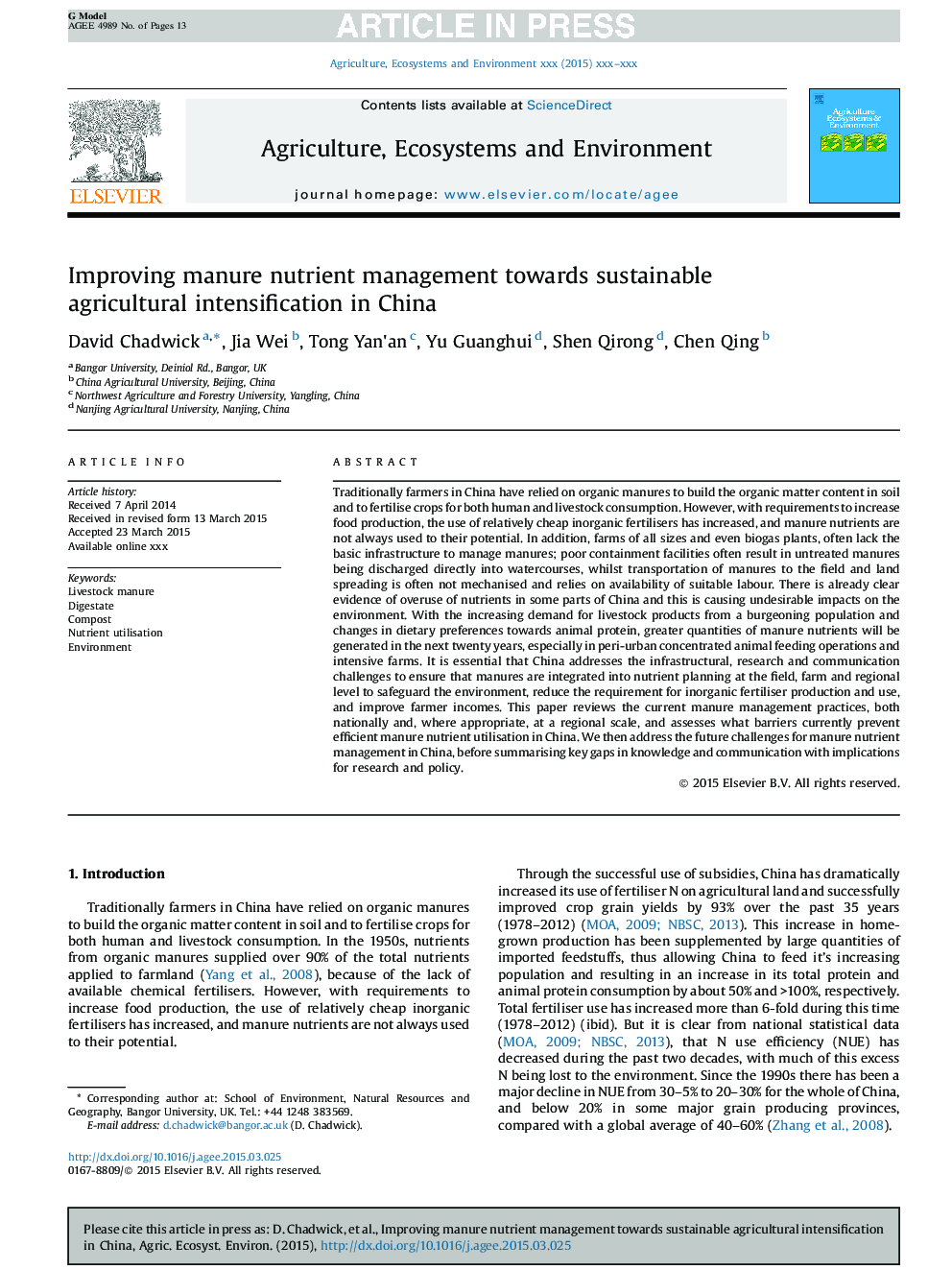| کد مقاله | کد نشریه | سال انتشار | مقاله انگلیسی | نسخه تمام متن |
|---|---|---|---|---|
| 8487686 | 1552043 | 2015 | 13 صفحه PDF | دانلود رایگان |
عنوان انگلیسی مقاله ISI
Improving manure nutrient management towards sustainable agricultural intensification in China
ترجمه فارسی عنوان
بهبود مدیریت مواد مغذی کود برای افزایش تشدید کشاورزی در چین
دانلود مقاله + سفارش ترجمه
دانلود مقاله ISI انگلیسی
رایگان برای ایرانیان
کلمات کلیدی
کود حیوانی، دیابت کمپوست، استفاده از مواد مغذی، محیط،
ترجمه چکیده
به طور سنتی کشاورزان در چین به مواد معدنی آلی برای احیاء مواد آلی در خاک و تولید کود برای مصرف انسان و دام استفاده می کنند. با این حال، با الزامات افزایش تولید مواد غذایی، استفاده از کودهای معدنی نسبتا ارزان افزایش یافته است، و مواد مغذی کود حتی همیشه به پتانسیل آنها استفاده نمی شود. علاوه بر این، مزارع از هر اندازه و حتی گیاهان زیست گیاهی، اغلب زیرساخت های اساسی برای مدیریت کود؛ امکانات ضعیف نگهدارنده اغلب باعث می شود که کود نیتروژن به طور مستقیم در جریان آب تخلیه شود، در حالی که حمل و نقل کود به حوزه و گسترش زمین، اغلب مکانی نیست و به در دسترس بودن کار مناسب بستگی دارد. در حال حاضر شواهد روشن در مورد استفاده بیش از حد از مواد مغذی در برخی از مناطق چین وجود دارد و این باعث ایجاد اثرات نامطلوب بر محیط زیست می شود. با افزایش تقاضا برای محصولات دام از یک جمعیت رو به رشد و تغییرات در رژیم غذایی نسبت به پروتئین حیوانی، در بیست سال آینده، به ویژه در عملیات تغذیه دام و طیور و مزارع فشرده، میزان مواد مغذی کودی تولید خواهد شد. ضروری است که چین به چالش های زیربنایی، تحقیق و ارتباطات برای اطمینان از اینکه کود به یک برنامه ریزی مواد مغذی در حوزه، مزرعه و منطقه می پردازد، برای حفاظت از محیط زیست، کاهش نیاز تولید و استفاده از کود معدنی و افزایش درآمد کشاورزان است. در این مقاله، شیوه های فعلی مدیریت کود، در سطح ملی و در صورت لزوم در مقیاس منطقه ای مورد بررسی قرار می گیرد و برآورد می کند که چه موانعی در حال حاضر مانع استفاده از مواد مغذی مفید در چین می شود. ما سپس به چالش های آینده در مورد مدیریت مواد مغذی کود در چین، قبل از خلاصه شکاف کلیدی در دانش و ارتباط با مفاهیم تحقیق و سیاست، رسیدگی می کنیم.
موضوعات مرتبط
علوم زیستی و بیوفناوری
علوم کشاورزی و بیولوژیک
علوم زراعت و اصلاح نباتات
چکیده انگلیسی
Traditionally farmers in China have relied on organic manures to build the organic matter content in soil and to fertilise crops for both human and livestock consumption. However, with requirements to increase food production, the use of relatively cheap inorganic fertilisers has increased, and manure nutrients are not always used to their potential. In addition, farms of all sizes and even biogas plants, often lack the basic infrastructure to manage manures; poor containment facilities often result in untreated manures being discharged directly into watercourses, whilst transportation of manures to the field and land spreading is often not mechanised and relies on availability of suitable labour. There is already clear evidence of overuse of nutrients in some parts of China and this is causing undesirable impacts on the environment. With the increasing demand for livestock products from a burgeoning population and changes in dietary preferences towards animal protein, greater quantities of manure nutrients will be generated in the next twenty years, especially in peri-urban concentrated animal feeding operations and intensive farms. It is essential that China addresses the infrastructural, research and communication challenges to ensure that manures are integrated into nutrient planning at the field, farm and regional level to safeguard the environment, reduce the requirement for inorganic fertiliser production and use, and improve farmer incomes. This paper reviews the current manure management practices, both nationally and, where appropriate, at a regional scale, and assesses what barriers currently prevent efficient manure nutrient utilisation in China. We then address the future challenges for manure nutrient management in China, before summarising key gaps in knowledge and communication with implications for research and policy.
ناشر
Database: Elsevier - ScienceDirect (ساینس دایرکت)
Journal: Agriculture, Ecosystems & Environment - Volume 209, 1 November 2015, Pages 34-46
Journal: Agriculture, Ecosystems & Environment - Volume 209, 1 November 2015, Pages 34-46
نویسندگان
David Chadwick, Jia Wei, Tong Yan'an, Yu Guanghui, Shen Qirong, Chen Qing,
